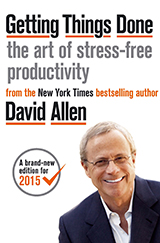 My notes on “Getting Things Done” by David Allen
My notes on “Getting Things Done” by David Allen
[Borrowed heavily from Josh Kaufmans notes]
1. Define what being “done” looks like
- Most of the tasks people keep on their to-do lists are “amorphous blobs of undoability” – commitments without any clear vision of what being “done” looks like
- What does the end point look like?
2. Mental work has five distinct phases
- Collecting inputs: resources, knowledge, and tasks. Get them all in one place before you begin
- Processing inputs: do it right now (if it takes less than 2 mins), delegate it, defer it to your calendar, or file it for later (or never)
- Organising into a system so you don’t have to remember it all. Tasks go on your to-do list, projects go on a projects list, future plans go into a tracking system, and reference information goes into a file or database you can access easily
- Doing work through the tasks you can accomplish right now
- Reviewing your work, revising your strategy, and improving your systems for better results
3. Get everything out of your head
- Our brains are optimized for fast decision-making, not storage
- Get it down into a journal (not a scrap of paper that you might lose)
- Once the information is out of your head, it’s far easier to figure out what to do with it
- Externalisation helps you feel less freaked out about your workload
4. Focus on the Next Action required to move forward
- Even the biggest project is just a series of small tasks
- What is the next task? Just focus on the action you need to take next
5. Use the “2 Minute Rule” for small tasks.
- If you can accomplish the task in less than two minutes, just do it now
6. Use Reference and Someday/Maybe files for things that have no immediate next actions
- Someday/Maybe lists are great for deferring ideas that you’d like to work on someday, but you’re not committing to right now
7. Build a trusted system that helps you keep track of your commitments.
- Your mind keeps things in working memory if it thinks you’ll lose them if it doesn’t
- That’s why Externalisation works – when you put something on paper in a place you know you’ll be able to find later, you’re freeing mental resources that can be put to better use elsewhere
8. An effective productivity system consists of:
- A list of active tasks – next actions you’ve committed to accomplishing in the next few days.
- A list of active projects – 4-20 project you’ve committed to accomplishing in the next few weeks.
- A calendar – commitments to meet with other people in the near future.
- A someday/maybe list – ideas you’d like to explore, but not right now.
- Reference files – information or documents you’ll need to refer to in the future.
- A capture device – some way of capturing ideas or next actions as you think of them.
9. Schedule non-negotiable time for a Weekly Review
- Process and organize – anything you’ve collected but haven’t handled yet.
- Review your active tasks – are there any to add, delegate, defer, or delete?
- Review your active projects – are there any to add, delegate, defer, or delete?
- Review your calendar – are there any meetings to add, delegate, defer, or delete?
- Someday/Maybe – anything to add or promote to an active project?
- Reference Files – anything you need soon? Anything to add or update?
- Goals – are you moving in the right direction? Are you making progress? Are any changes necessary?

I recently made the switch to a journal for note taking rather than loose leaf paper (upon your recommendation in fact!) and I’m finding I’m more productive when I get back to the office. There is less paper floating around basically.
It’s only a subtle change but if I can improve by 1% each day then I’m certainly heading in the right direction.
Thanks again Sheldon
Great stuff! Thanks for sharing Dan
Another nice review. Have the the book and your review has prompted me to revisit the methodologies and disciplines outlined. Enjoy the reviews.
Cheers
Kevin